List of monarchs of the Armenian Kingdom of Cilicia
The Armenian Kingdom of Cilicia was a state formed in the Middle Ages by Armenian refugees, who were fleeing the Seljuk invasion of Armenia.[1] It was initially founded by the Rubenian dynasty, an offshoot of the larger Bagratid family that at various times held the thrones of Armenia and Georgia. While the Rubenian rulers were initially regional princes, their close ties with the Western world after the First Crusade saw the principality recognised as a kingdom under Leo I by the Holy Roman Empire in 1198.[2] The Rubenid dynasty fell in 1252 after the death of the last Rubenid monarch Isabella, and her husband Hethum I became sole ruler, beginning the Hethumid dynasty. After the death of Leo IV in 1341 his cousin was elected to succeed him as Constantine II, the first king of the Lusignan dynasty. The kingdom fell at the beginning of Leo V's reign to the Mamluks,[3] and henceforth title holders were only claimants to the throne. Charlotte of Cyprus ceded the throne to the House of Savoy in 1485,[4] and the title fell out of use until after 1861.
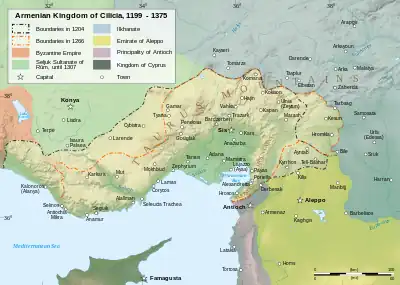
Lords/princes
| Name | Lifespan | Reign start | Reign end | Notes | Family | Image |
|---|---|---|---|---|---|---|
| Ruben I | 1080 | 1095 | Rubenids | |||
| Constantine I | 1095 | 1102 | Rubenids | |||
| Thoros I | 1102 | 1129 | Rubenids | |||
| Constantine II | 1129 | 1129 | Rubenids | |||
| Leo I | 1129 | 1140 | Rubenids | 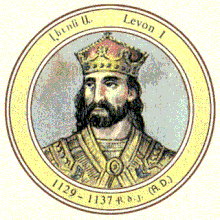 | ||
| Thoros II | 1144 | 1169 | Rubenids | |||
| Ruben II | 1169 | 1170 | Rubenids | |||
| Mleh | 1170 | 1175 | Rubenids | |||
| Ruben III | 1175 | 1187 | Rubenids | |||
| Leo II | 1187 | 1198/1199 | Became first king as Leo I | Rubenids | 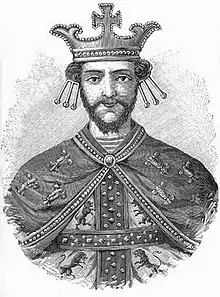 |
Kings and queens
| Name | Lifespan | Reign start | Reign end | Notes | Family | Image |
|---|---|---|---|---|---|---|
| Leo I (II) | 1198/1199 | 1219 | Rubenids |  | ||
| Isabella | 1219 | 1252 | Queen regnant, and co-ruler with Philip and Hethum I | Rubenids | 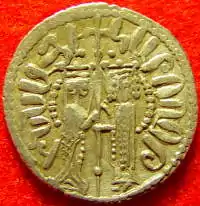 | |
| Philip | 1222 | 1225 | Co-ruler with Isabella | House of Poitiers | ||
| Hethum I | 1226 | 1270 | Co-ruler with Isabella until 1252 | Hethumids |  | |
| Leo II (III) | 1270 | 1289 | Hethumids | 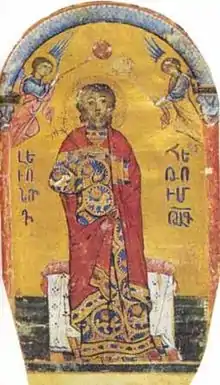 | ||
| Hethum II | 1289 | 1293 | Abdicated in favour of Thoros III | Hethumids |  | |
| Thoros III | 1293 | 1298 | Recalled Hethoum II, with whom he became co-ruler | Hethumids | ||
| Hethum II | 1295 | 1296 | Co-ruler with Thoros III | Hethumids |  | |
| Sempad | 1296 | 1298 | Usurper | Hethumids | 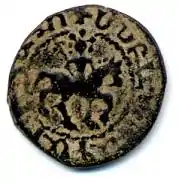 | |
| Constantine I (III) | 1298 | 1299 | Hethumids | 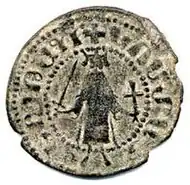 | ||
| Hethum II | 1299 | 1303 | Reclaimed throne. Abdicated and became regent for Leo III | Hethumids |  | |
| Leo III (IV) | 1303 | 1307 | Under regency of Hethum II | Hethumids | ||
| Oshin | 1307 | 1320 | Hethumids | 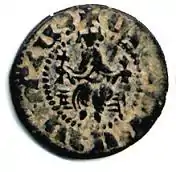 | ||
| Leo IV (V) | 1320 | 1341 | Under regency of Oshin of Korikos until 1329 | Hethumids | 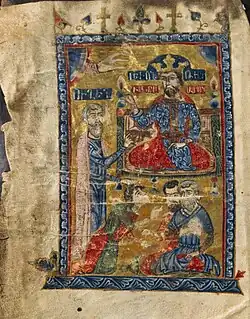 | |
| Constantine II (IV) | 1342 | 1344 | Elected by nobles | House of Lusignan | 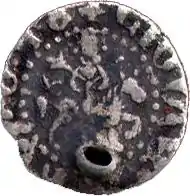 | |
| Constantine III (V) | 1344 | 1362 | House of Neghir |  | ||
| Constantine IV (VI) | 1362 | 1373 | House of Neghir |  | ||
| Leo V (VI) | 1374 | 1375 | House of Lusignan | 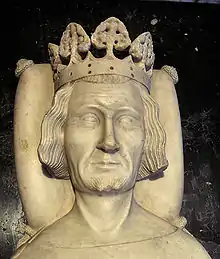 |
Claimants
| Name | Lifespan | Reign start | Reign end | Notes | Family | Image |
|---|---|---|---|---|---|---|
| Leo V | 1375 | 1393 | Lusignan |  | ||
| James I | 1393 | 1398 | Lusignan | |||
| Janus | 1398 | 1432 | Lusignan | |||
| John | 1432 | 1458 | Lusignan | %252C_RP-P-OB-5821.jpg.webp) | ||
| Charlotte | 1458 | 1467 | Lusignan |  |
Potential claimants today
The claim to the title passed to the House of Savoy, who were granted it by Charlotte in 1485. The Savoyard dynasts maintained their claim to the title "King of Cyprus, Jerusalem and Armenia" as late as the 20th century.[5]
Notes
- (in Armenian) Poghosyan, S.; Katvalyan, M.; Grigoryan, G. et al. Cilician Armenia (Կիլիկյան Հայաստան). Soviet Armenian Encyclopedia. vol. v. Yerevan, Armenian SSR: Armenian Academy of Sciences, 1979, pp. 406–428
- Kurdoghlian, Mihran (1996). Badmoutioun Hayots, Volume II (in Armenian). Athens, Greece: Hradaragoutioun Azkayin Oussoumnagan Khorhourti. pp. 29–56.
- Mutafian, p.90
- Lang, Robert Hamilton (1878), Cyprus, London: Macmillan and Co., p. 179, retrieved 2008-01-15
- Arielli, Nir (2010). Fascist Italy and the Middle East, 1933–1940. London: Palgrave MacMillan. p. 173. ISBN 978-1349312047.
References
- Boase, T. S. R. (1978). The Cilician Kingdom of Armenia. Edinburgh: Scottish Academic Press. ISBN 0-7073-0145-9.
- Mutafian, Claude (2001). Le Royaume Arménien de Cilicie. Paris: CNRS Editions. ISBN 2-271-05105-3.
- Histoire des Princes de Lusignan, Anciens Rois de Jérusalem, de la Petite Arménie et de Chypre, St. Petersbourg: Soikine, 1903.